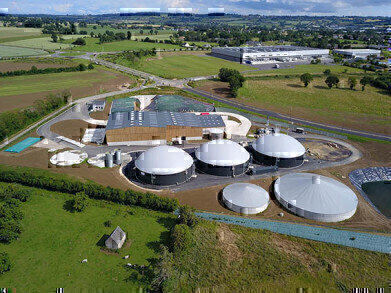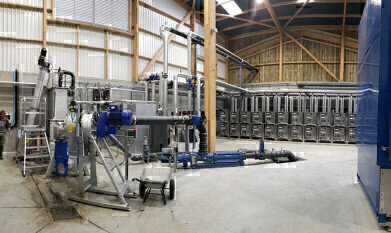Green Energy
French Biomethane Plant Goes Live
Dec 01 2020
The WELTEC BIOPOWER biomethane plant went live in Papillonnière near the town of Vire in Normandie, France. The operator of the 11-million-euro project, was rolled out by WELTEC and its project partner Agripower France. The plant has created three permanent jobs and digests a yearly amount of about 70,000 t of substrates to biogas, which is then processed to biomethane.
The raw material mix that comes from a radius of approximately seven km largely consists of inexpensive waste and other by-products from agriculture and the food industry. The regional, sustainable nature of the biomethane project is underlined by the fact that the operations belong to the agricultural company and the substrates come from the region. Two thirds of the 200 t of input substances needed every day consist of animal waste such as cattle and pig manure and liquid slurry. Whey, sludge and abattoir waste from food operations and from a pet food manufacturer belonging to Agrigaz account for another 20 percent. The rest of the substances is made up of maize, grass, whole plant silage, straw and grass silage.
The use of biomethane plays a key role in reducing greenhouse gases: Every hour, 270 standard m³ of the green biomethane are fed into the public gas grid for use as an energy source or as alternative fuel throughout France. "With this amount, some 5,300 t of CO2e can be saved every year", explains Alain Priser, who is in charge of WELTEC BIOPOWER's business in France. "Used as a natural gas equivalent, the biomethane could cover as much as 20 percent of the gas demand of Vire (population: 18,500). In the mobility sector, this quantity would be sufficient for driving a climate-neutral distance of 35 million km by car or circling the equator 890 times every year" says Alain Priser.
The solid input substances are introduced to the system with the help of two moving floor feeders (140 m³ and 98 m³) and a vertical screw feeder (30 m³). Additionally, some of these substrates are shredded in two MULTIMix units and mixed to ensure optimum digestion. The liquid substrates are first buffered in seven upstream tanks. Following the hygienisation of some input substances, the substrates are transported to three 4,436-m³ stainless-steel digesters. Two storage units are used solely for the purpose of storing the digestate for use as high-quality fertiliser by the agricultural company's farmers. "Our farmers thus also benefit from this by-product in that they save chemical fertiliser. Ultimately, this too is a key to reducing greenhouse gases", underlines Yves Lebaudy, the Managing Director of Agrigaz Vire.
A rather exceptional heat concept is used in Vire: The biomethane plant is supplied with the exhaust heat from a pet food manufacturer located at a distance of only 500 m, whose production process delivers enough heat for the hygienisation procedure of the biogas plant. For this purpose, Agrigaz Vire has connected the two locations with a hot water pipe. Through the use of heat pumps, part of the energy from the exhaust heat can be recovered and used to produce heat at a higher temperature level. Thanks to this thermodynamic system consisting of 24 heat pumps with a capacity of 50 kW each, all substrates except for the regrowing raw materials can be treated for one hour at 70°C in three hygienisation tanks of 15 m³ each. By contrast, the digesters do not need to be heated very much, as the hygienised input substances already have the temperature level required for the digestion process.
The sustainable cycle has resulted in a high level of acceptance by the entire population: "We are proud of our innovative joint project, which enjoys the backing of our farmers, politicians, entrepreneurs and residents alike", says Yves Lebaudy. Especially the inhabitants of Vire are eager to participate. They can deposit their waste in a new recycling centre with waste handover docks. In this way, they are able to actively support the operation of the biomethane plant with their own raw material, thereby contributing to the success of the project as a whole.
Events
IWA World Water Congress & Exhibition
Aug 11 2024 Toronto, Canada
Aug 25 2024 Stockholm, Sweden and online
Sep 03 2024 Mexico City, Mexico
Sep 03 2024 Mexico City, Mexico
Sep 03 2024 San Diego, CA, USA















